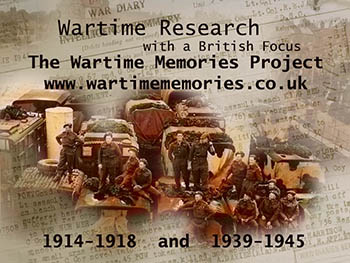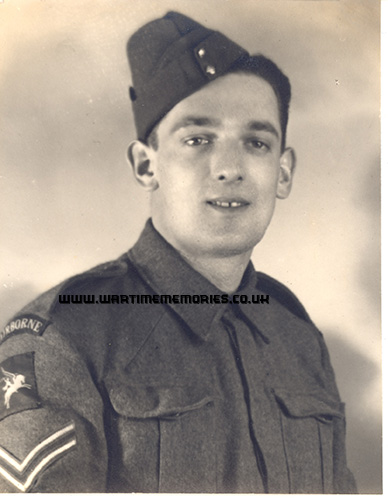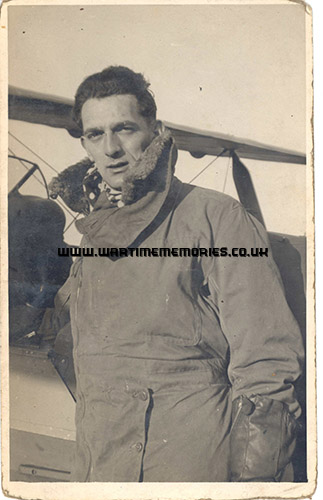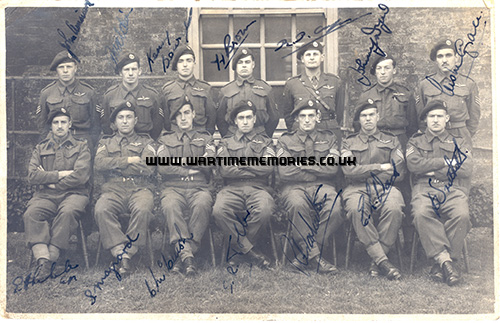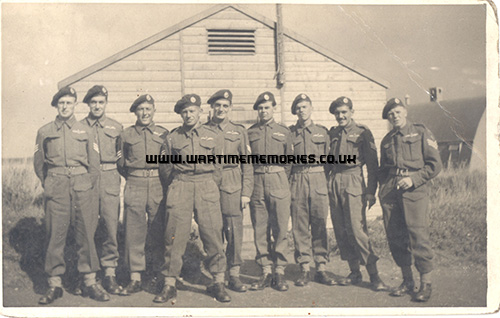S/Sgt. Roland Neville Giddens Warburton Glider Pilot Regiment
Roland Warburton joined up, somewhat reluctantly on 16th of October 1939. He had been working towards Civil Service Examinations and applied for exemption from call-up due to studies, but when all Civil Service exams were cancelled until further notice, he had to accept the call-up papers.
He was initially sent to 216th Searchlight Training Regiment R.E. On completion of the training he was posted to as a Gunner to 37th AA Battalion R.E. on 15th of January 1940.
In March of that year, he was granted leave and returned home to marry, a marriage that lasted 60 years, until his wife's death in the autumn of 2000. At that same time his Regiment came under the Royal Artillery, becoming 37th Tyne Electrical Engineers S/L Regiment, a Territorial Army unit.
As part of 307th Battery of that regiment, he embarked for France 18th of May 1940 landing at and deploying to protect the port of Le Havre. They were soon cut off from the remnants of the British Expeditionary Force that were being evacuated from Dunkirk and had to make their way westwards, eventually taking a ship from St Malo, arriving back in England 19th of June 1940.
After a period of leave he was sent to a training Battery attached to 37th S/L Regiment R.A. 28th July and promoted to Bombardier the next day. He was designated as Acting War Substantive Bombardier on 1st October, the promotion being confirmed at the turn of the year. On the 15th October he transferred to 519 Battery, 222nd S/L Training Regiment R.A. in the Taunton area where he remained until 5th of March 1942 when he volunteered to serve in the recently formed Glider Pilot Regiment.
Initial training was at Tilshead, on Salisbury Plain, before moving to 16 Elementary Flying Training School at Burnaston, Derbyshire at the beginning of May, where he learned to fly on Miles Magister aircraft. He completed his first solo flight a month later and passed out from 16 E.F.T.S. by the middle of July and was promoted to Sergeant, in line with G.P.R. requirements.
From there he went to No.1 Glider Training School at Thame, Oxfordshire, to fly the Hotspur glider. He graduated to the Operational Training Unit at the end of August and then to the Heavy Glider Conversion Unit at Brize Norton in mid-October to fly the much larger Horsa glider. December had him move to the Glider Pilot Exercise Unit before being posted to the 2nd Battalion of the Glider Pilot Regiment 3rd of March 1943.
A month later they embarked at Greenock for North Africa, landing at Oran, Algeria, 23rd of April 1943. During the sea voyage, they were re-designated as 2 Squadron G.P.R. as part of the 1st Airborne Division. There was a complete lack of gliders, but U.S.A. supplied a number of crated Waco CG.4 gliders, which some of the squadron helped to assemble.
After a few training flights, they were towed eastwards on a four-and-a-half-hour flight over the Atlas Mountains to their forward base in Tunisia at the end of June.
From here, on the night of 9th July, Operation Ladroke was launched to invade Sicily. His Waco carried half a platoon of the South Staffordshire Regiment who were tasked with neutralising several Italian gun positions and then capturing Ponte Grande on the approach to Syracuse.
He was fortunate in having a committed American pilot in the C-47 Skytrain aircraft that towed him to the designated release point, despite strong winds across the Mediterranean and some flak from the shore. He therefore landed about a mile short of the planned Landing Zone and his troops were able to carry out some of their tasks. Compared to the overall statistics of this operation, it was a notable achievement. Within a few days, the Glider Pilots were all evacuated by sea back to Tunisia and then moved on to Libya.
Two months after his first operation, he was back in action again during Operation Slapstick, a seaborne landing at Taranto on the Italian mainland on 9th September.
This time, he had to take the role of an infantry soldier as per the G.P.R. total soldier concept. The landing was unopposed, so there was no real fighting.
He told a story of a motorcycle accident at which he was presumed dead and was laid out in the morgue. Much to the medical orderly's surprise, he revived in the cool and sat up!
Probably as a result of this he was suspended from flying for medical reasons. He was returned to the rank of W/Cpl, although was permitted to continue wearing the Army Flying Badge.
At his own request, he transferred back to a Royal Artillery Searchlight unit, initially joining 422nd S/L Battery as from 3rd of September 1943 and participated in the gradual northwards advance of the 8th Army through Italy.
Maybe the motor cycle accident actually occurred in March 1944, as he was posted to the X(4) List on 3rd March and there is a gap in his service records for 5 months, but he remained in Italy until he was taken on strength of 323rd Independent Searchlight Battery on 7th of August 1944.
A whole year later, after the end of the War, the next entry on his service record shows him attending a 3-week course at an Army School in Perugia on 19th of August 1945, after which he was appointed as an Education Sergeant with the Central Mediterranean Force.
He talked about working with street children in Naples and also being sent to Klagenfurt in Austria to help with the processing and release of German & Italian POWs, but his service record shows no evidence of this.
He was finally sent home across Europe by train in January 1946 where he was reunited with his wife and demobilised, having earned the Defence Medal, the Africa Star and the Italy Star.
He went on to train as a teacher at Padgate College, near Warrington and spent the rest of his life teaching or as a Tutor Youth Officer. They had two children, but sadly the first was stillborn in 1946. They moved to Hertfordshire in 1955 where he lived until his death just before Christmas 2001.
He made a hobby of photography and was well respected in amateur photographic circles.


